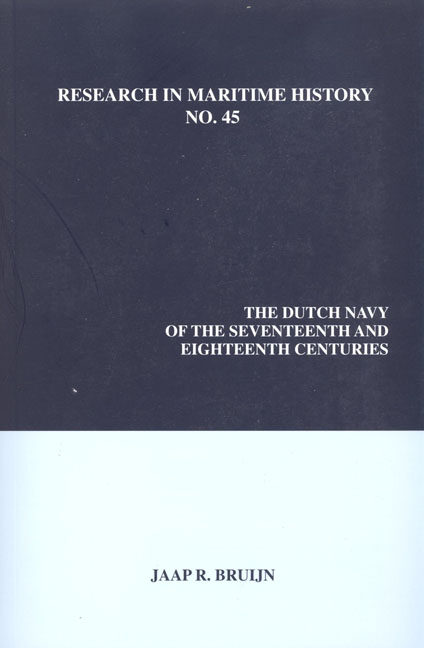Book contents
- Frontmatter
- Contents
- Illustrations
- Tables
- Series Editor's Foreword
- About the Author
- Introduction to the 2011 Edition
- Foreword
- Preface
- Introduction
- Map of the Dutch Republic
- Map of Dutch Naval Activity in European Waters
- Part One The “Old” Navy, Late 1500s-1652
- Part Two The “New” Navy, 1652-1713
- Part Three A Second-Rate Navy, 1714-1795
- In Retrospect
- Bibliography
- Index
Part One - The “Old” Navy, Late 1500s-1652
- Frontmatter
- Contents
- Illustrations
- Tables
- Series Editor's Foreword
- About the Author
- Introduction to the 2011 Edition
- Foreword
- Preface
- Introduction
- Map of the Dutch Republic
- Map of Dutch Naval Activity in European Waters
- Part One The “Old” Navy, Late 1500s-1652
- Part Two The “New” Navy, 1652-1713
- Part Three A Second-Rate Navy, 1714-1795
- In Retrospect
- Bibliography
- Index
Summary
During the last decade of the sixteenth century, the young Dutch Republic no longer had much to fear for its own existence. The Spanish Armada of 1588 had been beaten and dispersed; the Duke of Parma's Spanish army had been blockaded and then had become involved in France's civil troubles. The Dutch army, commanded by Prince Maurice of Nassau (1567-1625), had taken the initiative. Through successful campaigns, it conquered a great number of territories containing cities of various sizes. The so-called “Dutch garden” was closed. The strong political leadership of Grand Pensionary Johan van Oldenbarnevelt (1547-1619) had provided the financial means and the required internal cohesion.
There were more reasons than one for nineteenth-century Dutch historian Robert Fruin to regard the 1590s as the “Ten Years of the Republic.” The economic breakthrough to world primacy was launched. Dutch merchants and skippers had traditionally held an important stake in the transport of cheap bulk commodities over large parts of Europe. At this time, however, they began to widen the scope of their ventures in other parts of Europe, notably western Russia and the Mediterranean area, and in West Africa, the West Indies and Asia - thereby laying their hands on such “rich” trades as spices, sugar, caviar and textiles.
As a result of this comprehensive role in world shipping and trade, Dutch industry could dispose of a great variety of raw materials to be refined into semi-manufactured and finished products. Traditional dairy exports were now supplemented by several high-grade commodities. A sophisticated banking system was also created. Thousands of immigrants from the Southern Netherlands (modern Belgium) and later from Germany crowded into Holland and Zeeland to stimulate a further new growth. The pace of commercial and indusmal expansion was rapid, with the population increasing from some one and two-tenths million in 1550 to approximately one and a half million in 1600 and then to one and ninetenths million in 1650.
War and politics had always had a great impact on the Dutch economy. Indeed, as interesting as the economic and political history of the Republic is, it was a nation almost continuously involved in a war of independence. Maritime activities could be hampered by political measures like embargoes or by hostile war fleets and privateers.
- Type
- Chapter
- Information
- Publisher: Liverpool University PressPrint publication year: 2011

